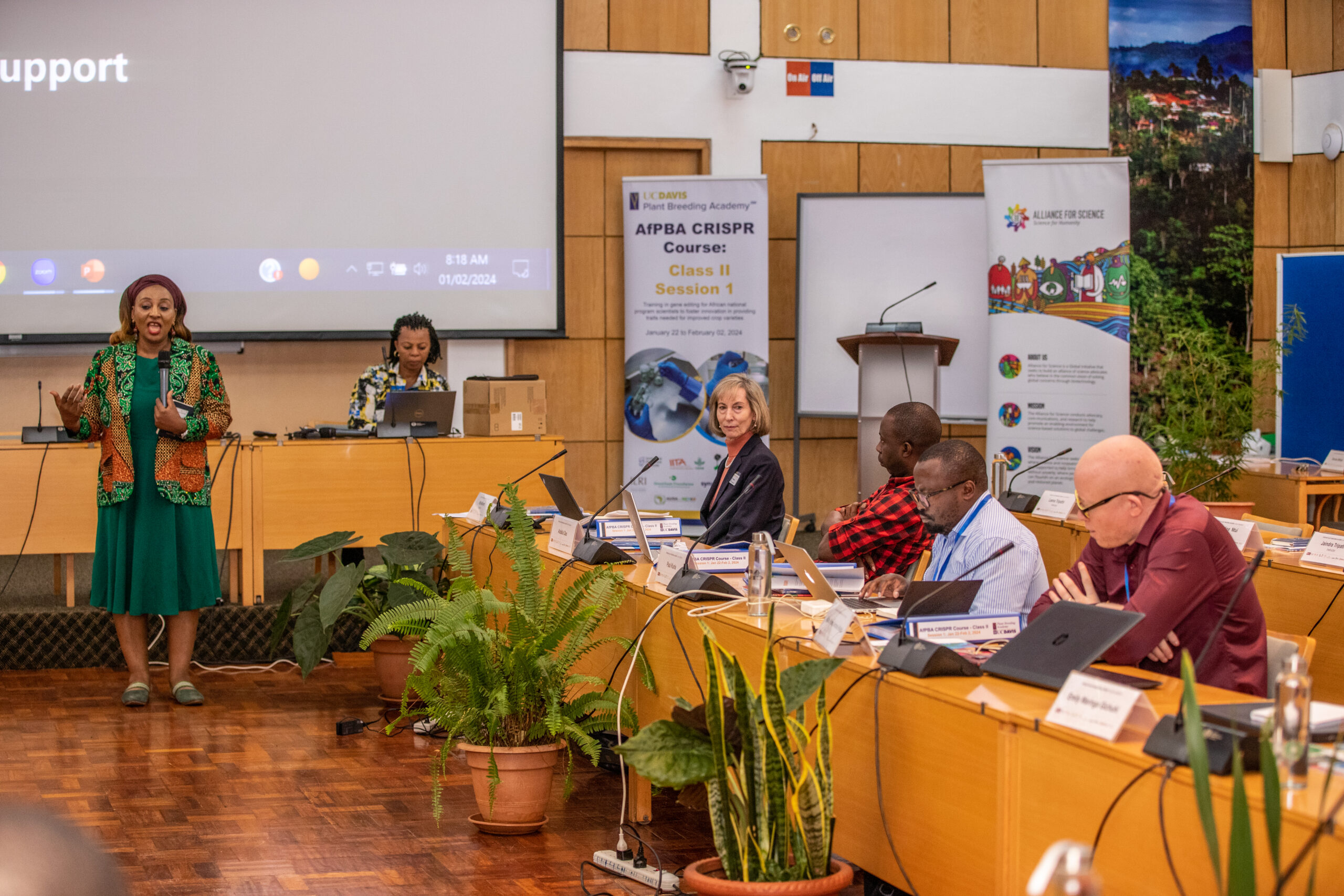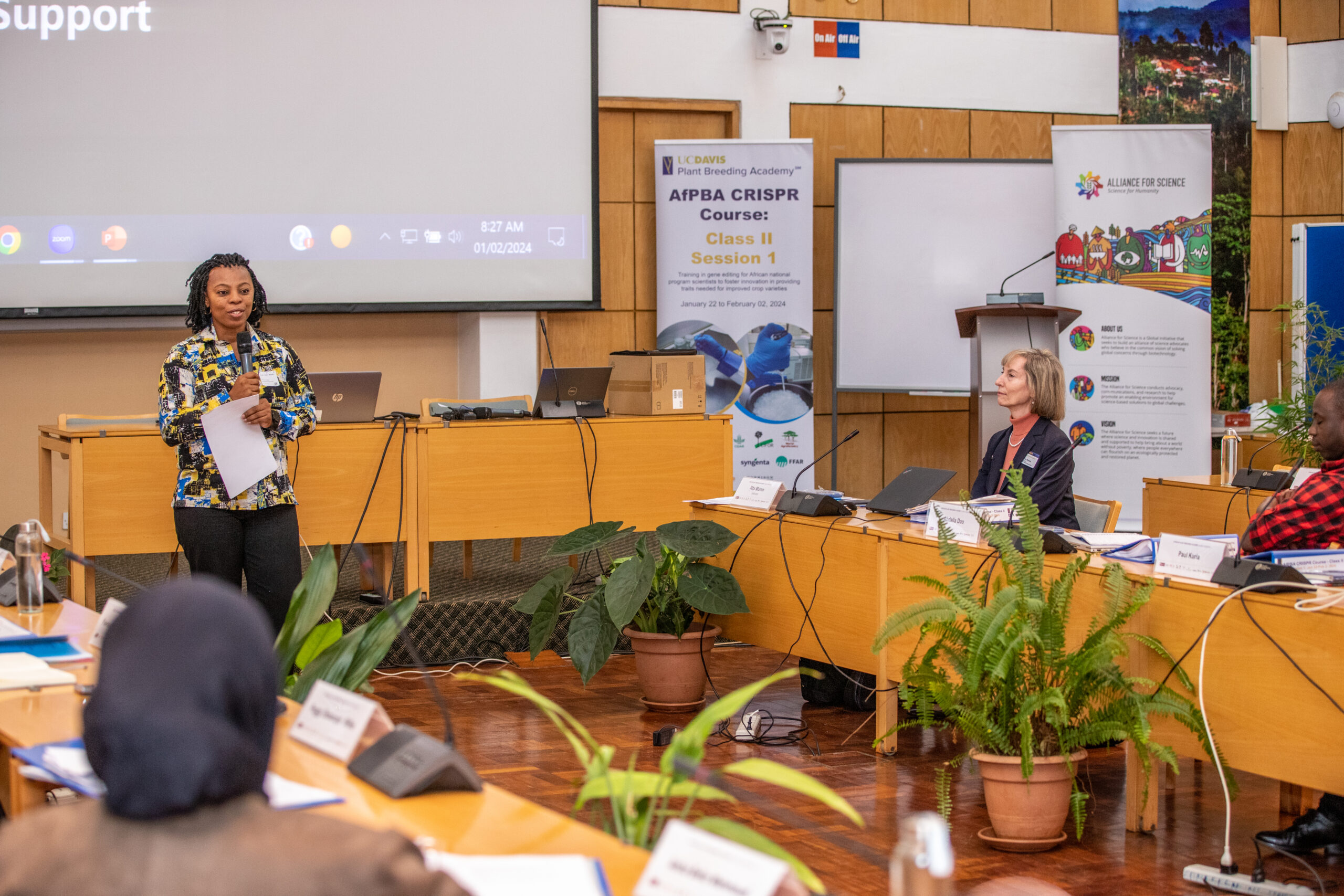The Alliance for Science collaborated with the Foundation for Food and Agriculture Research (FFAR), the Africa Orphan Crops Consortium (AOCCC), and the World Agroforestry Center to hold a training session on science communication to help amplify the voices of researchers and PhD students working in the field of agricultural biotechnology.
The training in Nairobi, Kenya, on February 1, 2024, aimed to empower them with effective tools for communicating about gene editing.
“The first thing we want to do is encourage and support you in your mission as the visionaries within the scientific field and for being leaders who will create movement not just within your communities and fields but also in your countries and internationally. We want to support you to be catalysts of change,” explained Dr Sheila Ochugboju, the Alliance for Science executive director.

Besides the leadership support aspect, the training was also meant to help the scientists see the context of geopolitics and the shifting dynamics surrounding scientific technologies and innovations to help them be more intentional and strategic in communicating to create change within and outside their institutions.
Scientific evidence leads to heated arguments
Gene editing, like climate change and vaccination, is an example of scientific areas marred with controversies where scientific evidence often leads to heated arguments and even strained relationships because the evidence clashes with deeply ingrained beliefs or group identities.
Thus, information that contradicts collective group knowledge or values tends to be dismissed, and any direct challenge to the group’s worldview may be seen as an attack on its legitimacy. So, it is important to grasp these groups’ values and connect on significant matters to counter misinformation and disinformation on genome editing.
These cultural attitudes become more decisive and evident, especially when it comes to the adoption and enforcement of regulations around gene editing.
For instance, although gene editing was endorsed under the African Union Agenda 2063, only South Africa, Nigeria, and Kenya have implemented guidelines for a case-by-case review of genome-edited crops.
However, no African country has approved one yet. Others like Burkina Faso, Ghana, Ethiopia, Sudan, Eswatini, and Zimbabwe have begun considering developing genome editing policies, while some, like Uganda, still lack a biosafety law.
“We are not starting fresh regarding regulations but rather adopting and updating existing ones. The regulations on gene-edited crops and animals emerge from the regulatory landscape developed for transgenic or GMOs. Policies around gene editing are influenced by two main factors,” explained Sol Guerrero Ortiz, a Mexico-based biologist who was also one of the trainers.
“First, by the international conversation around it, including the conventions to which certain countries are signatories. The other factor is the product versus process approach where regulations are based on either the genetic process or the final product.”
Share appropriate analogies
According to Nkechi Isaac, “communication in science is inescapable. We’re past the era where we sit in labs, do research, and then keep the results shelved because now people need to connect to what we do in the lab and why it’s important to their living. That’s why we need to explain what we are doing in the lab to people out there on how it will affect or benefit them.”

Communicating science means sharing, showing, teaching, or transferring knowledge about discoveries and innovations, especially regarding science and research.
Nkechi explained that there are five main approaches to communicating gene editing to the general public: Focus on public benefits and values; connect gene editing to human health solutions, talk about the evolution of genetic improvement, leverage experts as spokespeople, and finally, share appropriate analogies and visuals that explain science.
Language of the audience
In mid-2022, the Alliance for Science and FFAR set out to determine how the US public felt about gene editing in agriculture. According to their report, the consumers indicated that with an innovation like gene editing, it was important for them to hear from many different voices, ranging from researchers and credentialed experts to farmers who will use the technology.
“Gene editing can result in innovative solutions for abundant food, more nutritious food that is locally produced,” said Rita Mumm, the director of the AOCC.
“As the Africa Orphan Crop Consortium and the Africa Crop Breeding Academy, we witnessed a gap in science communication that justifies the need for this kind of training we have today, and we have been doing this for ten years now, and mainly we have trained plant breeders because they are the ones that develop the whole variety and combination of traits that farmers want and that consumers need. Therefore, they are best placed to talk to those other groups in the chain.”
Alliance for Science as an organization contributes to creating an enabling environment for scientific innovations by promoting research, supporting relevant policies on biosafety systems, and creating a community of researchers, scientists, and science enthusiasts.
“Additionally, we have continually established a South-South Collaboration on innovations with an agreement to form a pro-science group with those who have direct input in establishing and implementing policies and regulations on innovations such as genome editing,” explained Dr Ochugboju.
Value-based communication
The training also emphasized the importance of language in communicating science; that is, it is better to use the language of the audience or that most of the audience identifies with.
Value-based communication involves maximizing the effectiveness of the message by delivering it in a manner familiar to the target audience. The key principle is “connecting with people where they already are.” This involves identifying and utilizing the communication channels that the audience frequents the most.
According to Michael Onyango, the Alliance for Science Deputy Executive Director and Head of Partnerships, this also includes understanding who the best messenger is and involving them.
“Internally within your institutions, you have to identify who your boss listens to and befriend them. There’s more to communications; sometimes, you must do politics to achieve the greater good. Know who your superiors listen to. Those are the people to approach first with your proposals of innovations. Otherwise, you risk facing bureaucratical hurdles that may slow down your progress,” he said.
___________________________________________________________________________________________
Gloriah Amondi is a Kenya-based multilingual human rights lawyer, Mandarin teacher, and writer contributing to The Nation’s weekend editions. Her works have been published in journals such as Kalahari Review, Ibua Literary Journal, Lolwe Literary Magazine, and Dooney’s Café.
